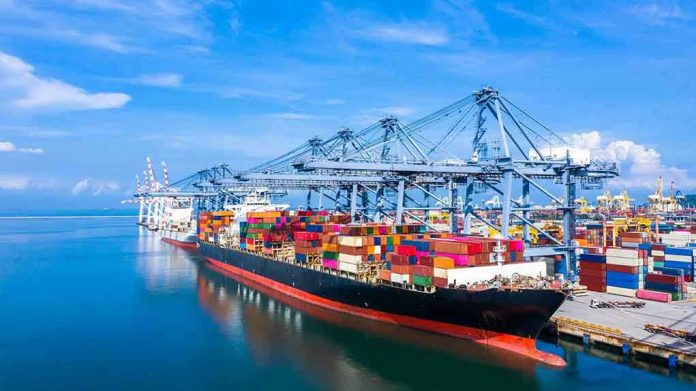
A new policy threatens to undermine international climate efforts, spurring debate over national sovereignty and economic interests.
Story Highlights
- The U.S., with Saudi Arabia, delayed a global shipping emissions framework.
- The framework aimed to set emissions limits and fees by 2050.
- Opposition cited economic concerns and potential consumer price hikes.
- Environmental groups decry delay as a setback for climate action.
U.S. and Allies Push Back Against Shipping Emissions Fees
In a significant move, the United States, alongside Saudi Arabia and other nations, successfully delayed the adoption of a global framework by the International Maritime Organization (IMO) designed to impose fees on shipping emissions. The decision, made after a vote that passed 57-49, postpones any action until October 2026. This initiative, intended to set stricter emissions limits for the shipping industry, faced opposition from the U.S., which argued that such fees would unfairly burden consumers by raising prices and constitute an illegitimate international tax.
U.S. Pressures Countries to Delay Fees to Clean Up Ship Pollution https://t.co/p3BQ3eP1u8
— Somini Sengupta🥭 (@SominiSengupta) October 17, 2025
President Donald Trump and Secretary of State Marco Rubio spearheaded the opposition, utilizing diplomatic leverage including threats of tariffs and visa restrictions to influence the vote. The proposed framework was set to make shipping the first industry with internationally mandated emissions reduction targets, but the U.S. and its allies viewed it as economically disadvantageous. The shipping industry, responsible for about 3% of global greenhouse gas emissions, remains without binding reduction targets due to this delay.
Concerns Over Economic Impact and Sovereignty
Critics of the proposed emissions framework argue that it would impose significant economic costs on the shipping industry and consumers. Scholars at Columbia University’s Center on Global Energy Policy estimate that by 2035, a midsize carrier could incur $1.5 million in annual fees, raising fuel costs by about 20%. These potential increases in operational costs have fueled concerns about competitiveness and economic disruption, particularly among major shipping nations and oil exporters like Saudi Arabia.
The U.S. administration emphasized that the framework infringes on national sovereignty and could lead to a form of international taxation. President Trump’s administration, known for its stance against multilateral climate agreements perceived as economically burdensome, celebrated the delay as a victory for American sovereignty and consumer protection. However, this decision has sparked criticism from small island developing states and environmental NGOs, which view the delay as a setback for urgent climate action.
Environmental Advocates Call for Renewed Efforts
Environmental groups and vulnerable island nations have expressed disappointment over the delay, seeing it as a failure to address the existential threat posed by climate change. Organizations like Seas At Risk and Transport & Environment argue that the lack of binding regulations leaves the shipping sector unregulated and undermines global climate goals. They urge countries to return with stronger support for the framework in future negotiations, highlighting the moral imperative to protect vulnerable communities from the impacts of climate change.
The postponement of the framework until at least October 2026 leaves the shipping industry in regulatory uncertainty, potentially hindering investment in green technologies. Meanwhile, climate-vulnerable nations remain at risk, facing heightened threats from rising sea levels and extreme weather events. The delay has amplified divisions between major economies and island nations, as well as between economic interests and environmental priorities.
Sources:
U.S. Pressures Countries to Delay Fees to Clean Up Ship Pollution – SAN News
Nations delay vote on shipping decarbonization rules after fierce US resistance – Mongabay




